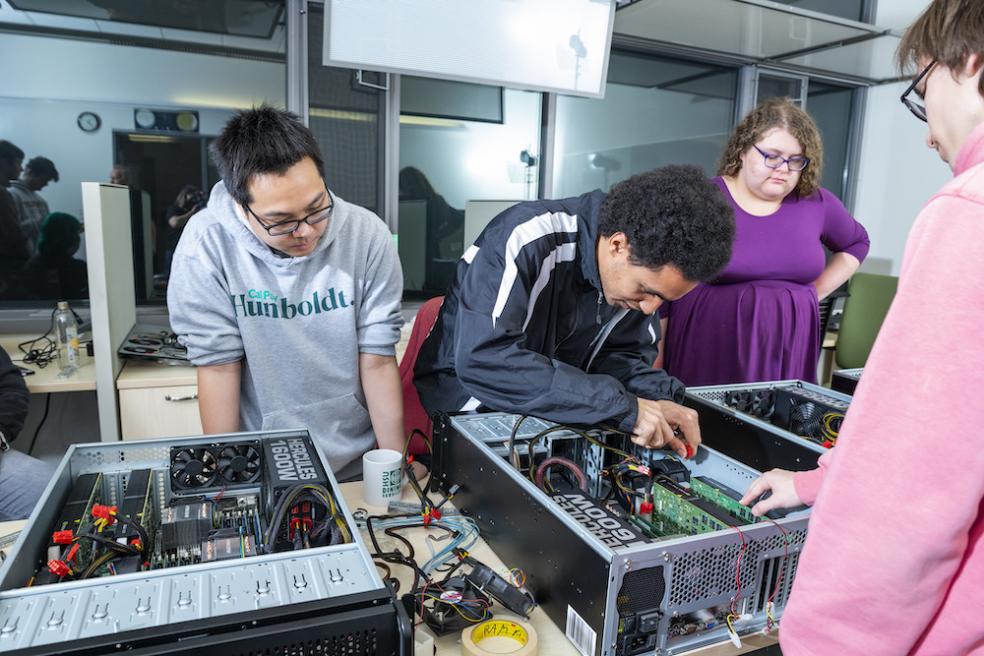
Cal Poly Humboldt’s Software Engineering students are doing just that by learning to develop, operate, and maintain systems with a focus on sustainability, equity, and justice.
The program itself involves the design and production of software, which is essential in daily tasks including using cell phones and sending emails.
An ethical component of Cal Poly Humboldt’s Software Engineering degree encourages students to explore what is moral. Part of this process involves analyzing different case studies, biases in data, and what software should and should not be used for, says Sharon Tuttle, Computer Science professor.
The program’s graduates aim to answer big questions like: “How do we make responsible use of AI techniques, or big data? How do you make secure software that lets more people participate in democracy?” Tuttle explains.
”The Humboldt mindset is something the software engineering field very much needs,” she says. “The programs that are created affect our world, and Humboldt has a long tradition of trying to say, ‘how can we make the world better?’”
Opportunities to merge the University’s strengths in the natural resources and sciences with technology also make Software Engineering a particularly good fit for Humboldt, Tuttle says.
Software can be applied in just about any area including: accounting, aviation, gaming, geospatial technology, medicine and zoology. Graduates in this fast-growing field can pursue careers such as:
- Application Developer
- Systems Software Developers
- Full Stack Developer
- Quality Assurance Engineer
- Security Engineer
- DevOps Engineer
- Blockchain Engineer
- Software Architect
They can also work on embedded software projects, which are used in virtually every industry from aeronautics to medicine. Examples include plug-in devices that monitor a home's energy use, and devices that use sensors and software to report available parking spaces on campus.
The demand for software engineers is on the rise. According to the Bureau of Labor Statistics, computer development jobs are growing significantly faster than average at a rate of 25% by 2032. The median annual salary for someone in this field is more than $127,000.
First-year Software Engineering student Kadin Cooper was drawn to the degree for its growing career opportunities and his passion for coding.
“I chose Software Engineering due to its coding nature and in addition, it's a growing field. There's lots of job opportunities in any part of the globe,” he says.
He is a problem solver who hopes to change the world with his education by creating more secure software. Eventually, he hopes to work for a big tech company. In the meantime, he’s building community and hands-on experience through opportunities like working on the campus’ super computer.

Such hands-on, interdisciplinary experiences prepare Cal Poly Humboldt’s Software Engineering students for a diversity of careers. Almost all of the program's courses have a lab component where students practice concepts learned in the classroom. Students also have the opportunity to work on projects off and on campus—such as on the University’s supercomputer, the Humboldt CS Club’s annual hackathon, or various makerspaces.
Tuttle hopes there will be several opportunities to work with companies and projects in the community. “We've got the fiber cable coming in from Singapore and we hope Software Engineering students will be able to be involved in some of the projects that arise from that,” she says.
Software Engineering is a relatively young field, Tuttle explains, and because of that, students can help shape their field and what they learn in the University’s program. “We hope we're going to put in a nice grounding of the Humboldt ideas of ethics and environment into that,” she says.
“There are a lot of areas where I think our software engineering graduates can be very, very helpful. I don't think there's enough software engineers who think about the big picture,” she says. “We're really hoping that Humboldt students will go out and be the voice of reason or the voice of equity in their workplaces.”